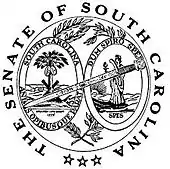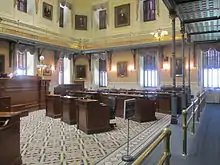South Carolina Senate
The South Carolina Senate is the upper house of the South Carolina General Assembly, the lower house being the South Carolina House of Representatives. It consists of 46 senators elected from single member districts for four-year terms at the same time as United States presidential elections.
South Carolina State Senate | |
|---|---|
| South Carolina General Assembly | |
 | |
| Type | |
| Type | |
Term limits | None |
| History | |
New session started | January 12, 2021 |
| Leadership | |
President of the Senate | |
Majority Leader | |
Minority Leader | |
| Structure | |
| Seats | 46 |
.svg.png.webp) | |
Political groups | Majority
Minority
|
Length of term | 4 years |
| Authority | Article III, South Carolina Constitution |
| Salary | $10,400/year + per diem |
| Elections | |
Last election | November 3, 2020 (46 seats) |
Next election | November 5, 2024 (46 seats) |
| Redistricting | Legislative Control |
| Meeting place | |
 | |
| State Senate Chamber South Carolina State House Columbia, South Carolina | |
| Website | |
| South Carolina State Senate | |
The South Carolina Constitution of 1895 provided for each county to elect one senator for a four-year term. The election of senators was staggered so that half of the state Senate was elected every two years. After the U.S. Supreme Court ruled in 1964 for the case Reynolds v. Sims, the state Senate was reapportioned in 1966 as a temporary measure into 27 districts with 50 members for two-year terms. In 1967, the state Senate was again reapportioned, this time into 20 districts with 46 members for four-year terms. The number of districts was reduced to 16 in 1972 and in 1984, they were eliminated with the creation of single member districts.
The annual session of the General Assembly convenes at the State Capitol Building in Columbia on the second Tuesday of January of each year. However, after convening, either the House or the Senate may call for itself a 30-day recess by a majority vote, or a longer recess by a two-thirds vote.[2]
Composition
| Affiliation | Party (Shading indicates majority caucus) |
Total | |||
|---|---|---|---|---|---|
| Republican | Democratic | Vacant | |||
| Current Session | 30 | 16 | 46 | 0 | |
| Latest voting share | 65.2% | 34.8% | 100% | ||
Members of the South Carolina Senate
Except as noted, all Senators were elected in November 2020 and terms began on January 12, 2021. All terms expire in January 2025.
Composition of the Senate over time
| Year | Democratic Party |
Republican Party |
Independent / Other |
Majority |
|---|---|---|---|---|
| 1865 | 0 | 0 | 31 | 31 |
| 1868 | 6[lower-alpha 1] | 25 | 0 | 19 |
| 1870 | 5 | 26 | 1 | 21 |
| 1872 | 8 | 25 | 0 | 17 |
| 1874 | 0 | 26 | 7[lower-alpha 2] | 19 |
| 1876 | 15 | 18 | 0 | 3 |
| 1878 | 28 | 5 | 0 | 23 |
| 1880 | 33 | 2 | 0 | 31 |
| 1882 | 33 | 2 | 0 | 31 |
| 1884 | 32 | 3 | 0 | 29 |
| 1886 | 33 | 2 | 0 | 31 |
| 1888 | 35 | 0 | 0 | 35 |
| 1890 | 32 | 3 | 0 | 29 |
| 1892 | 36 | 0 | 0 | 36 |
| 1894 | 29 | 0 | 7[lower-alpha 3] | 22 |
| 1896 | 36 | 0 | 0 | 36 |
| 1898– 1908 |
41 | 0 | 0 | 41 |
| 1910– 1916 |
44 | 0 | 0 | 44 |
| 1918– 1964 |
46 | 0 | 0 | 46 |
| 1966 | 43 | 6 | 1 | 37 |
| 1968 | 47 | 3 | 0 | 44 |
| 1970 | 44 | 2 | 0 | 42 |
| 1972 | 43 | 3 | 0 | 40 |
| 1976 | 42 | 4 | 0 | 38 |
| 1980 | 39 | 7 | 0 | 32 |
| 1984 | 36 | 10 | 0 | 26 |
| 1988 | 35 | 11 | 0 | 24 |
| 1992 | 30 | 16 | 0 | 14 |
| 1996 | 25 | 21 | 0 | 4 |
| 2000 | 22[lower-alpha 4] | 24[lower-alpha 4] | 0 | 2 |
| 2004 | 20 | 26[lower-alpha 5] | 0 | 6 |
| 2008 | 19 | 27 | 0 | 8 |
| 2012 | 18 | 28 | 0 | 10 |
| 2016 | 18 | 28 | 0 | 10 |
| 2020[3] | 16 | 30 | 0 | 14 |
- The election of a Democrat from Abbeville was declared void and the seat remained vacant.
- All 7 were members of the Conservative Party of South Carolina.
- All 7 were Independent Democrats.
- After the 2000 elections, the Senate was evenly split between 23 Democrats and 23 Republicans. A Democrat, J. Verne Smith of Greer, switched to the Republicans to break the tie.
- Republicans gained an additional seat in a 2007 special election.
References
- "Massey Named New SC Senate Majority Leader". wltx.com. Retrieved 23 March 2018.
- "ARTICLE 3. Legislative Department., SECTION 9. Sessions of General Assembly". 2010 South Carolina Constitution - Unannotated. Archived from the original on March 4, 2012. Retrieved January 16, 2012.
- "South Carolina Election Results". New York Times. 4 November 2020. Retrieved 4 November 2020.
- Dubin, Michael J. (2007) Party affiliations in the state legislatures : a year by year summary, 1796-2006.
External links
- South Carolina State House Online
- South Carolina Legislative Information Tracking System allows users to track legislative information via custom reports, tracking lists or subscription services. Services are provided via web search or Palm Pilot.
- The South Carolina Senate Democratic Caucus
- The South Carolina Senate Republican Caucus
- Project Vote Smart – State Senate of South Carolina